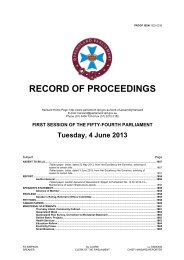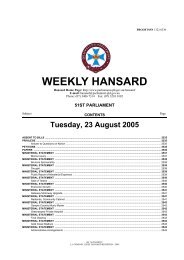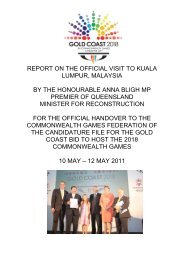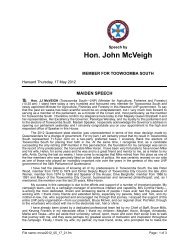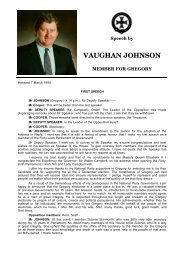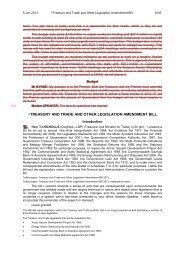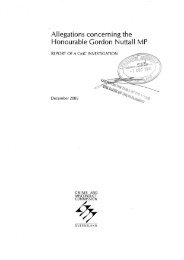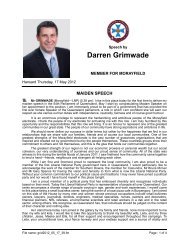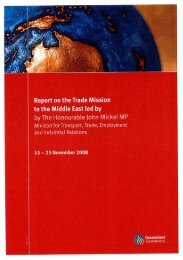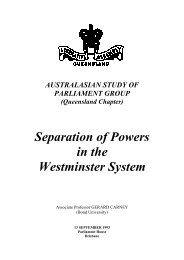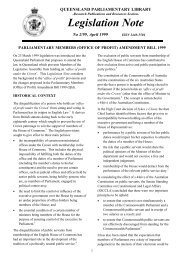Full transcript - Final - Queensland Parliament - Queensland ...
Full transcript - Final - Queensland Parliament - Queensland ...
Full transcript - Final - Queensland Parliament - Queensland ...
Create successful ePaper yourself
Turn your PDF publications into a flip-book with our unique Google optimized e-Paper software.
9 Mar 1999 Land and Resources Tribunal Bill 365<br />
instance is justified, but what I find totally<br />
unacceptable is that the presiding members<br />
are being elevated to the same status as the<br />
judges of the superior courts of <strong>Queensland</strong>.<br />
By giving the tribunal members the same<br />
status as Supreme and District Court judges,<br />
this Government is creating an unhealthy<br />
precedent. Why give these members a status<br />
which is not required? Why give these<br />
members a status equivalent to justices and<br />
judges who are required to deal with the most<br />
complicated of civil and criminal matters and<br />
across the total spectrum of the law? I hope<br />
that this is not a case of mates' rates. There<br />
will be quite a degree of cynicism in the<br />
community that this Government is<br />
establishing an ad hoc body with a status for<br />
its presiding members above and beyond what<br />
is necessary and one to which it will be<br />
tempted to appoint its supporters.<br />
The Opposition's concern is heightened<br />
by the wording of clause 8, which sets out the<br />
eligibility for appointment as a presiding<br />
member. The clause requires that a presiding<br />
member must, amongst other things, have<br />
knowledge or experience of indigenous issues<br />
and one or more of three other matters. One<br />
of these is mining or petroleum issues. Yet the<br />
clause goes on to oust from judicial review the<br />
appointment of presiding members insofar as<br />
they fail collectively to possess any knowledge<br />
of mining or petroleum matters.<br />
Quite rightly, in Alert Digest No. 1 of 1999<br />
the Scrutiny of Legislation Committee has<br />
questioned whether this is appropriate, but<br />
there is an even bigger issue here. The<br />
Government is abolishing the Wardens Court,<br />
yet at the same time it is sending a clear<br />
message that, although knowledge of<br />
indigenous and land issues is absolutely<br />
essential for appointment as a presiding<br />
officer, knowledge or experience in mining or<br />
petroleum matters is not.<br />
Again and again the Premier claims that<br />
he is doing everything he can to encourage<br />
mining investment, yet we see in this Bill a<br />
totally blinkered approach to this essential<br />
industry. How can this tribunal operate<br />
effectively if none of the presiding members<br />
has any experience or knowledge of mining or<br />
petroleum matters?<br />
Let me repeat: this tribunal will be hearing<br />
more than simply native title matters. It is the<br />
primary body for matters arising from both the<br />
Mineral Resources Act and the Fossicking Act.<br />
In these circumstances, to legislatively oust<br />
judicial review from appointments because<br />
none of the presiding members has any<br />
knowledge or experience in mining matters is a<br />
retrograde step and has the potential to<br />
undermine the tribunal's effectiveness from the<br />
outset. If this clause is not amended, the<br />
Premier needs to give an undertaking to this<br />
<strong>Parliament</strong> that at least one of the presiding<br />
members will have the requisite knowledge or<br />
experience of mining and petroleum matters.<br />
In this context, it is also to be borne in<br />
mind that the decisions of this tribunal are<br />
subject to ministerial override. This fact is<br />
highlighted in the Premier's speech, and<br />
examples of the override are set out in the<br />
Scrutiny of Legislation Committee's Alert<br />
Digest. In fact, the committee pointed out that<br />
there is no reference in the Bill to the existence<br />
of the override and pointed out that this<br />
omission could lead to a misunderstanding in<br />
the community of the status of the tribunal's<br />
decisions.<br />
The committee recommended that the Bill<br />
be amended so as to make it clear to the<br />
community and litigants that decisions of the<br />
tribunal are subject to ministerial override. This<br />
is a sensible recommendation and one that I<br />
would hope the Premier and the Government<br />
would take up. It is only reasonable that they<br />
do so. It would put plain English into the<br />
legislation in an eminently relevant way,<br />
making the legislation a document which<br />
ordinary people could use.<br />
I think the more significant element is that<br />
this tribunal, unlike the Supreme or District<br />
Courts, is subject to overriding political<br />
decisions. It is not a body which is<br />
independent of the policy process. It is not a<br />
body of either unlimited or almost unlimited<br />
jurisdiction or even a body whose decisions<br />
have to be accepted and followed as of right.<br />
It is a very limited body in almost every sense.<br />
In these circumstances, to elevate the<br />
presiding members to, in effect, the status of<br />
justices and judges of the superior courts is<br />
totally unjustified. I suggest strongly to the<br />
Premier that he reconsider this aspect of the<br />
legislation. I ask the Premier whether the views<br />
of the Chief Justice or the Chief Judge of the<br />
District Court were sought and, if so, whether<br />
they were in concurrence with this proposal.<br />
Another troubling matter is the very limited<br />
appeal rights granted. The Bill limits a party to<br />
a proceeding before the tribunal to appeals on<br />
questions of law. I ask the Premier: why are<br />
appeal rights so circumscribed? Would there<br />
be any harm in allowing appeals on questions<br />
of fact? While there may be good reasons for<br />
limiting grounds of appeal, there is no logic in<br />
further hamstringing the process by requiring<br />
that when the appeal is against a decision of a<br />
Land Court non-presiding member or a mining



